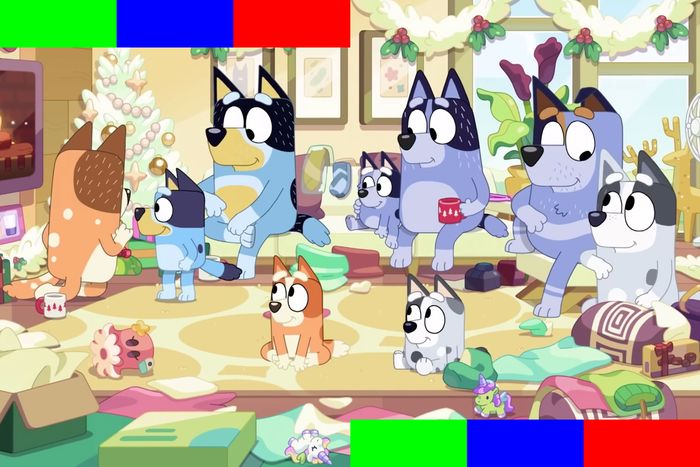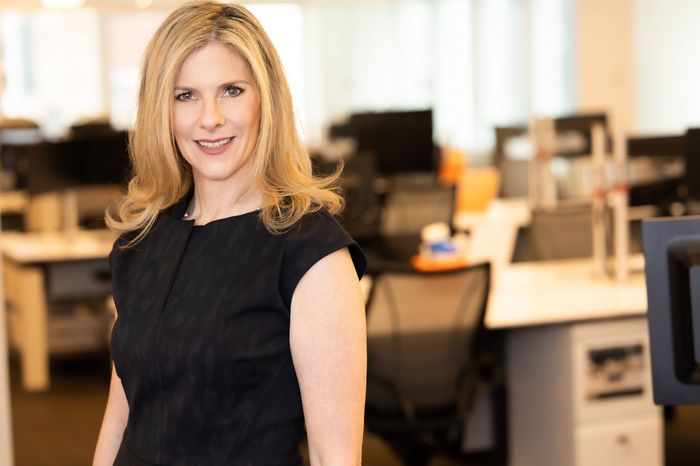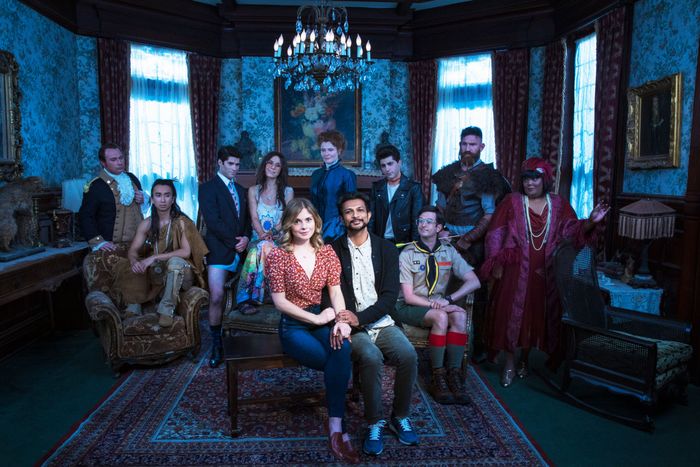
If you live in the U.K., almost everything the BBC makes for its television networks can be streamed in one place via its on-demand service, iPlayer. For those of us in the colonies, however, figuring out how to watch the latest offerings from the Beeb takes a lot more work, even in the age of streaming. That’s very much by design.
While major commercial-entertainment conglomerates such as Disney or Comcast have spent the last few years working to consolidate their content libraries into one central streaming play, the BBC has adopted a far more traditional, piecemeal strategy to distributing its content in the U.S., similar to the so-called “arms dealer” approach of companies such as Sony and, until recently, Paramount Global. Instead of funneling buzzy successes such as Bluey, I May Destroy You, or Mood onto a single BBC-branded streamer for Stateside audiences, the company has instead farmed out its biggest shows to whichever network or platform stepped up with the best offer. It’s a strategy that maximizes revenue, minimizes risk, and perhaps most importantly, makes it more likely BBC titles will find an audience rather than just end up as another tile on a supersize streamer. “As all these other companies are spending like mad and delivering these huge stream
ing services, we are super well-positioned to be a major supplier,” says Rebecca Glashow, CEO of global distribution for BBC Studios, the commercial arm of the public broadcaster.
To be sure, BBC is very interested in the direct-to-consumer streaming business — it’s partnered with ITV on the drama-heavy streamer BritBox — and it has plans to expand its offerings in the rapidly-growing free, ad-supported market (more on that later). But at the same time, at least for now, “We’re not going to bet the farm [on an iPlayer-like offering] when we know how dependent all these services are on getting high quality content into their platforms,” Glashow explains. “We have so much content across so many genres that we are able to power up other streamers” and networks. And over the last few years, BBC Studios — building on past critical successes such as Prime Video’s Fleabag and HBO’s I May Destroy You — has done exactly that, seeding several streamers with big successes:
➽ Disney+: Despite the Mouse House boasting a century-old library of its own animated classics, global phenom Bluey — the Australian kids show co-produced by BBC Studios — now regularly ranks as the biggest library program on Disney’s signature streamer, per Nielsen. It’s also one of the most-watched acquired series in all of streaming. And earlier this year,, Disney expanded its relationship with BBC Studios by renewing longtime ABC hit Dancing With the Stars for two seasons and moving it to Disney+, making it a test case for live programming on the platform.
While Disney+ has refused to say how DWTS performed for the platform, there are plenty of indications it was a success: The series regularly trended on Twitter during its weekly Monday livestream, while Parrot Analytics reports the dancing competition had more audience demand this fall than 99.7 percent of all unscripted titles in the U.S. Meanwhile, BBC Studios’ original-productions unit in Los Angeles is also behind the Nat Geo/Disney+ unscripted series Life Below Zero, which recently spawned the spinoff Life Below Zero: First Alaskans. And late next year, the latest incarnation of BBC’s global franchise Doctor Who will become a Disney+ exclusive outside of the U.K., giving the streamer another boost with genre audiences.
➽ CBS/Paramount+: The U.S. adaptation of BBC comedy Ghosts, produced by CBS Studios with Lionsgate and BBC Studios, has become a scary big hit for CBS, recently surpassing the Eye’s Young Sheldon to become TV’s most-watched comedy as measured by Nielsen’s extended 35-day ratings. But the Thursday night series also has been a success on sibling streamer Paramount+, beating out P+ originals and library classics such as Frasier to rank as the platform’s most-streamed comedy, per CBS Research.
➽ AMC+/BBC America: BBC America’s iconic drama Killing Eve is now over, but the BBC continues to have luck providing buzzy content to the channel and its streaming cousin AMC+. This Is Going to Hurt has already started popping up on critics’ best-of-2022 lists (including Vulture’s) and is getting lots of awards chatter, while Mood also drew strong reviews when it arrived in the States last month.
According to Glashow, BBC Studios’ strategy of agnostically selling its wares to any platform willing to pay the right price is an outgrowth of the fact that the BBC is an entity funded by the citizens of the U.K. “We are a commercial arm of a public service business,” she explains. “Our ultimate [mission] is to deliver as much value to it so we can continue to make incredible content through the public service arm.” In other words, Glashow’s job is to figure out how to deliver as many pounds and Euros as she can so the BBC can keep doing what it does in the U.K. That’s why going all-in on a centralized streamer — the way so many media companies did a few years back — was probably never seriously in the cards. It would have meant giving up millions in guaranteed profits in exchange for years of losses as BBC tried to scale such a product.
Given what has happened in the streaming business this year, the Beeb’s decision to stick with a more traditional approach is looking very smart right now. Bigger companies such as Warner Bros. Discovery and Disney have conceded in recent months that going all-in on streaming has been far less profitable than expected. Had BBC gone down the same path, it would be feeling at least as much pain, if not more, given its relative size. Instead, BBC has been able to invest the money it saved by not launching a big streamer into developing more original content — programming that’s in turn being snapped up by the bigger platforms still hungry for subscribers.
And as noted earlier, BBC Studios is doing much more than simply finding U.S. homes for already-produced episodes of its U.K.-made programming. Its Los Angeles–based production outpost has never been busier, setting up a record number of adaptations while also working on wholly original ideas born here in the States. “We have developed, sold, produced, and launched more new shows in the past two years than we have previously in our tenure as a production company here,” says Valerie Bruce, general manager of BBC Studios Los Angeles Productions. Indeed, since 2020, Bruce’s division has been behind nearly a dozen series across eight different linear and streaming platforms, including shows at all four broadcast networks, as well as Netflix, Disney+, and Peacock. BBC’s Stateside success is most obvious on Thursday nights, where it has CBS’s aforementioned smash Ghosts (the product of a first-look development deal struck with Lionsgate back in 2018) and two half-hours on Fox (Call Me Kat and Welcome to Flatch, produced with Warner Bros. TV and Lionsgate, respectively).
While Netflix and other streamers have demonstrated that American audiences are more than willing to get invested in ideas produced in and for other countries — think everything from Squid Game to BBC’s own Fleabag — BBC Studios’ success with Thursday comedies underscores how U.S. platforms remain very interested in remaking proven hits specifically for domestic consumption. “We don’t have to just count on original ideas all the time,” Bruce explains. American networks and streamers often “like to invest in things with maybe a little less degree of risk,” she says, and that means companies with rich libraries of pre-existing shows — or “formats” as they’re called in the distribution business — start out with a leg up in the eyes of potential buyers. “They can see the success someplace else without having to spend money on it,” Bruce says. “You’re really in a fortunate position if you have IP, and in our case that’s formats.”
Adapting formats to the tastes of local audiences is hardly a new strategy, of course. Some of the biggest TV hits of the past 50 years, both scripted (The Office, All in the Family, Sanford and Son, Three’s Company, House of Cards) and unscripted (American Idol, Dancing with the Stars, Who Wants to Be a Millionaire), started out as British originals. But what streaming has changed, to a degree, is the potential for international format rights holders such as BBC to monetize both the original series and the remake at the same time. NBC’s version of The Office, for example, didn’t materialize until more than a year after Ricky Gervais’s series had wrapped its run on the BBC and, here in the U.S., on BBC America.
But when execs at CBS ordered a remake of Ghosts, they didn’t give a second thought to the fact that the comedy was still in production in the U.K., or that the show was streaming on HBO Max. CBS and later Peacock similarly had no problem commissioning domestic takes on ITV-produced Love Island even as the OG series continued to steam up Hulu. Glashow says the old rules surrounding windowing of content “were never for the audience” and that platforms allowing viewers to see all iterations of a creative concept ends up being a net plus, boosting both the original and the remake. “It ultimately just makes them that much more loyal, and just builds that much more attention,” she says.
Direct-to-Consumer on the FAST Track
While BBC Studios’ biggest successes have come from producing hits for other platforms, or through the longevity and adaptability of unscripted formats such as Dancing With the Stars, Glashow is quick to emphasize that the company does very much have an interest in the direct-to-consumer space, both linear and streaming. As noted earlier, the company continues to supply content such as Mood to BBC America, its decades-old cable partnership with AMC Networks. “Cable is a declining marketplace that is still also an incredibly healthy business, and AMC has treated our channel as one of their own,” Glashow says. “So I think we’re committed to maintaining those relationships as long as possible, as anyone is who’s in the cable space, because it’s an incredible business.” That said, it’s clear that streaming is the focus of BBC Studios’ consumer-facing strategy:
➽ BBC supplies both original and library drama content to BritBox, a joint venture with U.K. broadcaster ITV launched five years ago in the U.S. (Glashow sits on the board of directors for BritBox International). While the service is still relatively small — around 3 million global subscribers — it does give BBC Studios a foot-in-the-door of the premium-subscription video space.
➽ Ditto BBC Select, a niche subscription streamer launched in early 2021 which targets audiences interested in the company’s documentary and factual programming. BBC has limited start-up costs for the platform by not releasing a dedicated app but instead going through the Amazon, Apple TV, and Roku channels programs, which handle all the technical aspects behind a streaming service, including user interface. “The service has been a big surprise to us,” Glashow says. “The appetite for our brand and having direct access to our breadth of documentary and history programming has really blown us away,” she said, declining to reveal how many subscribers the platform has signed up.
➽ Like so many other media companies of late, BBC Studios is active in the free, ad-supported streaming TV (FAST) lane, particularly when it comes to its kids and unscripted offerings. This year it launched BBC Kids–branded channels on Pluto TV and Roku, and it also has FAST channels devoted to the Beeb’s cooking and home/garden programming. “What FAST does is unlock our ability to deliver content to these really eager fan bases, and market directly to them as well,” Glashow says, adding that she sees significant upside in continuing to mine the BBC library for ad-supported streaming opportunities. “You will certainly see us pushing more heavily into that, as we invest much more significantly across FAST,” she predicts.
➽ There have also been hints BBC’s storied news division could be looking to make a major move into streaming here in the States (and around the world). Over the summer, the BBC in London said that as part of its new “digital-led” strategy, it plans to phase out its existing domestic news channel as well as its globally-distributed BBC World News (available to millions of cable and satellite subscribers here in the U.S.). In its place will be a single BBC News channel seen globally, with live anchors broadcasting from Washington, D.C., during the overnight hours in the U.K. BBC News has said it will double the size of its team in the U.S. and Canada and has created two new senior exec roles to lead the beefed-up operations here.
While BBC Studios, which distributes BBC News outside the U.K,, has given no hints it plans to exit the cable ecosystem here, it doesn’t seem a stretch to think it might be considering a way to either make the revamped BBC News channel available on streaming, or that content from the platform will make its way to some other sort of BBC-branded FAST channel. Indeed, Glashow strongly suggested she is looking to bring the BBC News brand to U.S. streaming — though she played it coy when asked how she could do so without invoking the ire of cable operators who currently pay for BBC World News exclusivity. “I would say, ‘Watch this space,’” Glashow said. “We feel really bullish about what we’re delivering in the news space, and even more excited about Deborah Turness, who’s come over from NBC News to serve as CEO of BBC News in the U.K. Delivering to international audiences is a core priority, and you will see us continuing to expand across other platforms — both our investment in journalists on the ground here, as well as products in the marketplace — over the next six months. … I think it’s on us to make it as easy as possible for a consumer to get to BBC News.”
Of course, as successful as BBC Studio’s U.S. efforts have been recently, it is still operating in the same competitive — and increasingly challenged — streaming universe as its for-profit peers. While BBC remains a beloved brand in Britain, the company has had to deal with years of Conservative governments implementing budget cuts, and is now talking openly about the likelihood of its linear channels going away within a decade. And while streamers such as Netflix and Prime Video still partner with BBC Studios on projects, or license already-produced projects, they also continue to spend hundreds of millions on making their own shows with British talent (like The Crown) and in recent months have made it clear they plan to slow or even freeze their overall level of investment in new content.
But despite these headwinds, BBC Studios execs think the company is well-positioned to continue its recent hot streak, both in setting up projects at U.S. streamers and, perhaps more crucially in 2023, in expanding its direct-to-consumer business. “Every bet that we’ve placed in the market so far, whether it be BritBox, BBC Select, or what we’ve launched so far in FAST, we’ve been overwhelmed by the breadth and depth of the audiences, and the appetite for our content,” Glashow says. “That’s why you’ll see us continue to expand.”






